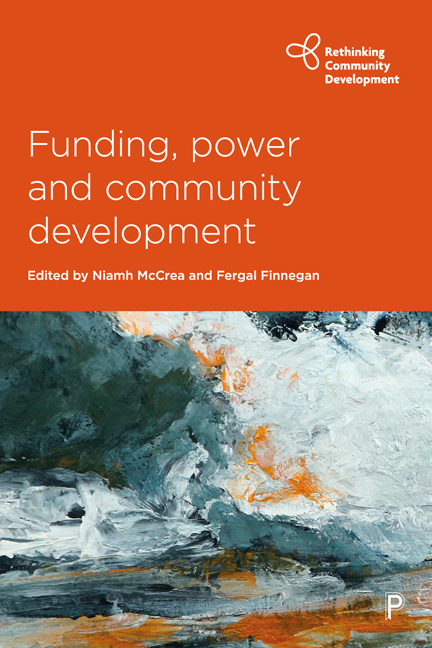Book contents
- Frontmatter
- Contents
- Series editors’ preface: Rethinking Community Development
- Acknowledgements
- Abbreviations
- Notes on contributors
- One Funding, power and community development: an introduction
- PART 1 New configurations of power and governance
- PART 2 Questions of state and grassroots democracy
- PART 3 Modes of agency and horizons of possibility
- Index
Four - The reinvention of ‘civil society’: transnational conceptions of development in East-Central Europe
Published online by Cambridge University Press: 19 April 2022
- Frontmatter
- Contents
- Series editors’ preface: Rethinking Community Development
- Acknowledgements
- Abbreviations
- Notes on contributors
- One Funding, power and community development: an introduction
- PART 1 New configurations of power and governance
- PART 2 Questions of state and grassroots democracy
- PART 3 Modes of agency and horizons of possibility
- Index
Summary
If we take the United Nations’ definition of community development as a ‘process where community members come together to take collective action and generate solutions to common problems’ (United Nations, 2010), East-Central Europe has a rich and ongoing history of such initiatives that have played a decisive role in the build-up of ‘modern’ institutions throughout the region (Stokes, 1986). Thus, East-Central Europe offers rich ground for reflection on how modernity and community development are understood in relation to each other. Yet it should be noted that community development as a specific term has limited currency in East-Central Europe. In fact, it has been a discourse of ‘civil society’ rather than ‘community development’ that has been dominant in the region in making sense of social change from the bottom up. This chapter explores how the notion of ‘civil society’ in East-Central Europe, and the discursive and organisational practices attached to the term, have been deployed in politics and how this has affected how local development and empowerment are conceived and funded. In this respect, struggles over the meaning and practice of ‘civil society’ activism in the region, speak to long-standing debates within the community development field relating to the role of state and market; the status, function and relevance of professionalised organisations within communities; the relationship between political and economic freedoms; and the possibilities for meaningful transnational solidarity.
The specific way of framing community action and democracy in a given context matters a great deal. We will argue that far from being a transparent term for self-organisation at a local and then, cumulatively, at a national level, the notion of civil society is burdened with complex transnational historical baggage. Its emergence and use as a paradigmatic concept for denoting civic activism and self-organisation happened within a specific historical process – the so-called democratic transitions – in which local institutions, organisations and movements were expected to serve the reintegration of the region into global markets. Against this backdrop, we analyse civil society as an ideologically loaded notion, the historical construction of which was marked by the dominant epistemic and geopolitical hierarchies of the post-socialist period.
- Type
- Chapter
- Information
- Funding, Power and Community Development , pp. 55 - 68Publisher: Bristol University PressPrint publication year: 2019

